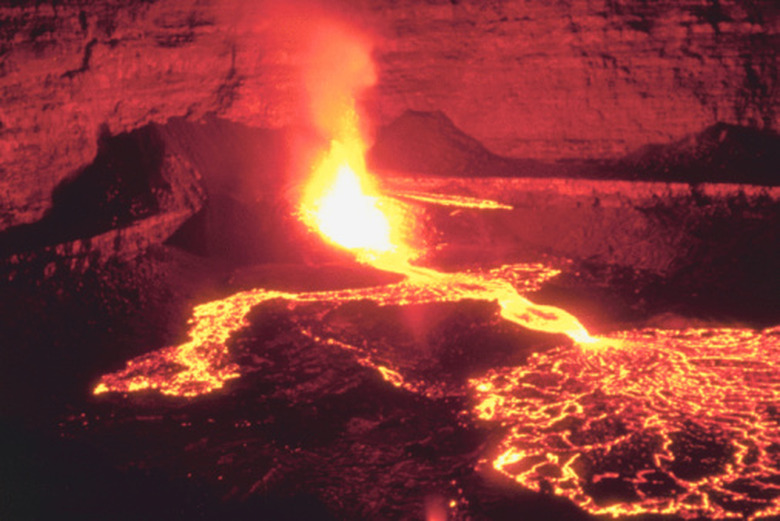What Are Indicators That A Volcano Is Going To Erupt?
Volcanic eruptions are an essential part of how the earth makes new landforms over a long period of time. However, the spewing of lava and smoke is deadly to those around the eruption. So it has become essential for scientists to devise methods to predict an eruption. Luckily, volcanoes often give off several indicators that they are going to erupt.
Seismic Waves
Seismic Waves
Seismic waves are energy waves produced on the earth's crust. Most natural seismic waves are caused by the shifting of plates, which results in earthquakes. However, explosions on the earth's surface also causes seismic waves in the crust. Importantly, seismic waves can not travel through a liquid medium, such as magma. If scientists believe that a volcano is close to erupting, they can try detonating small explosions on or around the volcano. If they detect no seismic waves, than it is an indicator that the volcano is going to erupt soon.
Magnetic Fields
Magnetic Fields
Several rocks found around volcanoes contain metals that are magnetic, which also means they give off a magnetic field (a force that attracts electrically charged atoms, known as ions, around it). However, magnetic fields cease to work beyond a certain temperature known as the Curie Temperature which varies based on the metal. Magma underneath the surface can heat rocks to their Curie Temperature. If rocks near a volcano lose their magnetic field, they could an indicate an impending eruption.
Ground Deformation
Ground Deformation
Even when it is close to the surface, magma does not just explode out of a volcano instantaneously; instead, it slowly moves up to the peak of the volcano which can take a long time. As magma moves closer to the peak of the volcano, the surrounding area starts to swell. This swelling can be monitored by instruments.
Changes in Heat and Gas
Changes in Heat and Gas
As magma flows upward, it also causes changes in the chemical properties of the surrounding area, including an increase in heat flow, gas pressure and electrical resistance. Gas pressure changes as hydrogen chloride and sulfur dioxide are emitted before the volcano erupts. Electrical resistance goes down with the increased temperature. Additionally, groundwater in the area of a volcano heats up and even sometimes boils before an eruption.
References
Cite This Article
MLA
Lichtenstein, Drew. "What Are Indicators That A Volcano Is Going To Erupt?" sciencing.com, https://www.sciencing.com/indicators-volcano-going-erupt-8430309/. 24 April 2017.
APA
Lichtenstein, Drew. (2017, April 24). What Are Indicators That A Volcano Is Going To Erupt?. sciencing.com. Retrieved from https://www.sciencing.com/indicators-volcano-going-erupt-8430309/
Chicago
Lichtenstein, Drew. What Are Indicators That A Volcano Is Going To Erupt? last modified March 24, 2022. https://www.sciencing.com/indicators-volcano-going-erupt-8430309/
